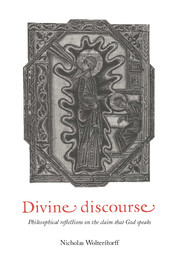Book contents
- Frontmatter
- Contents
- Preface
- 1 Locating our topic
- 2 Speaking is not revealing
- 3 The many modes of discourse
- 4 Divine discourse in the hands of theologians
- 5 What it is to speak
- 6 Could God have and acquire the rights and duties of a speaker?
- 7 Can God cause the events generative of discourse?
- 8 In defense of authorial-discourse interpretation: contra Ricoeur
- 9 In defense of authorial-discourse interpretation: contra Derrida
- 10 Performance interpretation
- 11 Interpreting the mediating human discourse: the first hermeneutic
- 12 Interpreting for the mediated divine discourse: the second hermeneutic
- 13 Has Scripture become a wax nose?
- 14 The illocutionary stance of biblical narrative
- 15 Are we entitled?
- 16 Historical and theological afterword
- Notes
- Index
14 - The illocutionary stance of biblical narrative
Published online by Cambridge University Press: 01 June 2011
- Frontmatter
- Contents
- Preface
- 1 Locating our topic
- 2 Speaking is not revealing
- 3 The many modes of discourse
- 4 Divine discourse in the hands of theologians
- 5 What it is to speak
- 6 Could God have and acquire the rights and duties of a speaker?
- 7 Can God cause the events generative of discourse?
- 8 In defense of authorial-discourse interpretation: contra Ricoeur
- 9 In defense of authorial-discourse interpretation: contra Derrida
- 10 Performance interpretation
- 11 Interpreting the mediating human discourse: the first hermeneutic
- 12 Interpreting for the mediated divine discourse: the second hermeneutic
- 13 Has Scripture become a wax nose?
- 14 The illocutionary stance of biblical narrative
- 15 Are we entitled?
- 16 Historical and theological afterword
- Notes
- Index
Summary
How can human discourse mediate divine discourse when the human discourse in question propounds error or expresses morally offensive attitudes? That question has sounded like a ground bass throughout a good deal of our discussion; and often, when it wasn't actually sounding, it was implied. Already in Chapter 3 I observed that when double agency discourse takes the form either of deputation or appropriation, it will typically be the case that not everything said by the agent of the mediating discourse is also said by the agent of the mediated discourse. And in Chapter 12 I took note of some of the general patterns of difference which emerge when we interpret the human discourse of the Bible for the divine discourse which it mediates, given the assumption that God speaks only what is true and conducive to love.
I want now to discuss one more aspect of this general theme. Since it concerns the genre of the Bible's mediating discourse, it would have been appropriate to discuss it earlier. But if one accepts the suggestion I will be making, one will find that some of the wax-nose anxiety which I discussed in the preceding chapter is thereby alleviated; that makes it appropriate to discuss it here. Up to this point in my discussion, my concern with interpretation has been entirely hermeneutical, that is to say, methodological and second-order in character.
- Type
- Chapter
- Information
- Divine DiscoursePhilosophical Reflections on the Claim that God Speaks, pp. 240 - 260Publisher: Cambridge University PressPrint publication year: 1995



